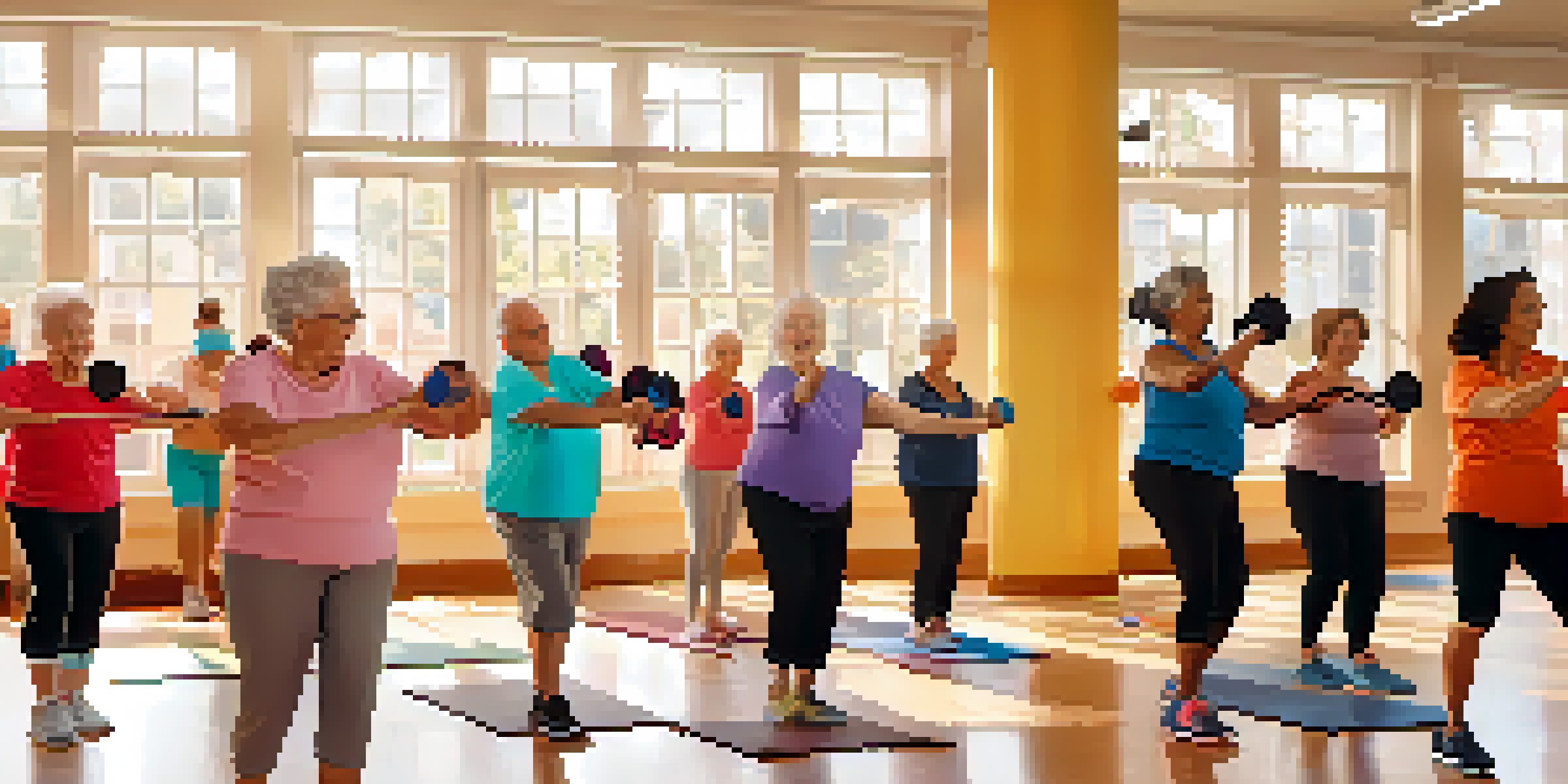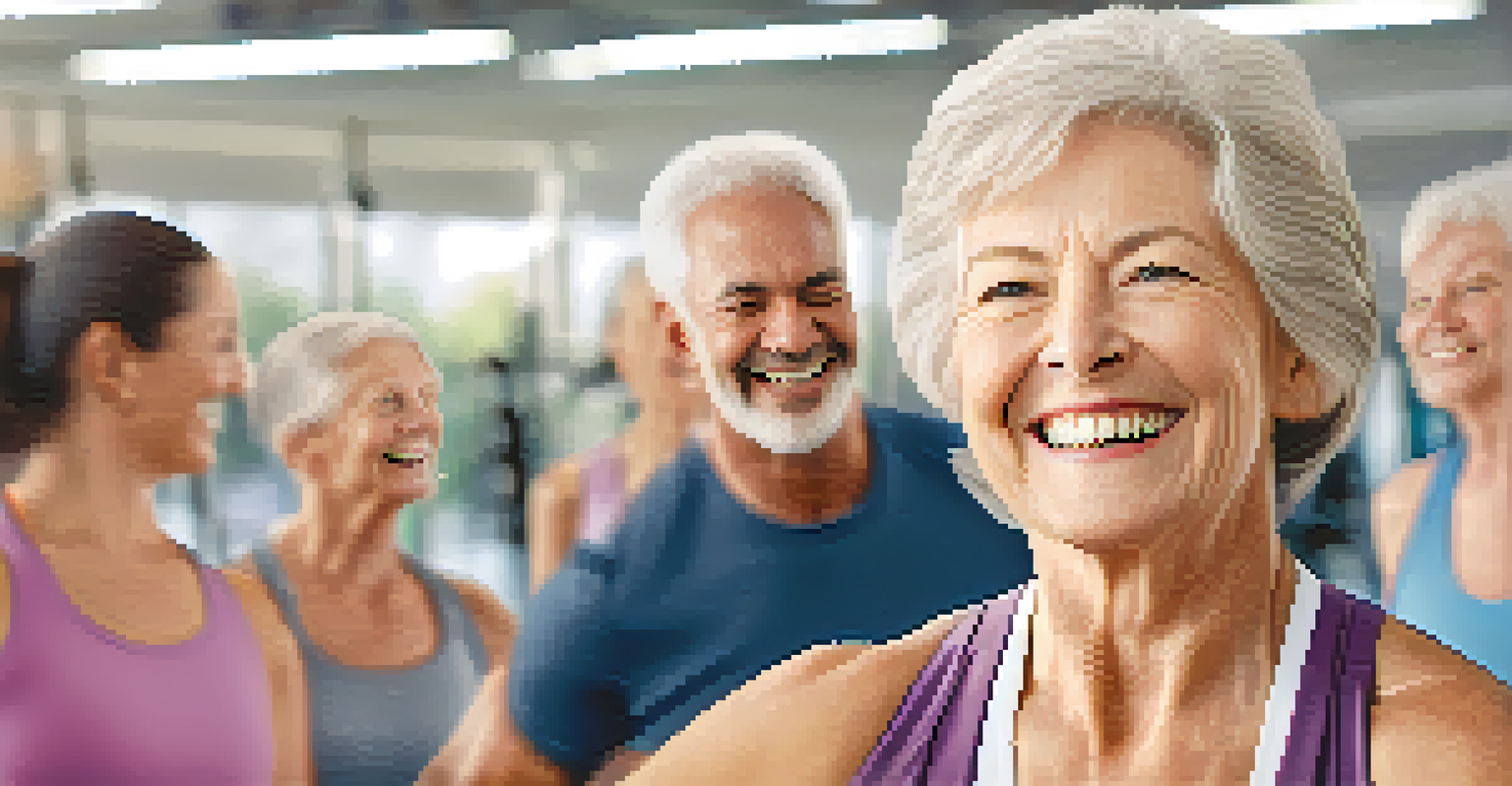Understanding the Benefits of Senior Fitness Classes

The Importance of Fitness for Seniors' Health and Well-Being
Staying active is vital for seniors, as it helps maintain physical health and emotional well-being. Regular exercise can reduce the risk of chronic diseases, improve mobility, and enhance overall quality of life. Additionally, fitness can combat feelings of depression and anxiety, providing a natural boost to mental health.
The greatest wealth is health.
Engaging in physical activity also promotes social interaction, which is crucial for mental stimulation and emotional support. Senior fitness classes create a welcoming environment where individuals can connect with peers who share similar interests. This sense of community fosters camaraderie and encourages consistent attendance.
Moreover, fitness activities tailored for seniors can be adapted to accommodate different abilities and fitness levels. This adaptability ensures that everyone, regardless of their starting point, can participate and benefit from exercise, making fitness inclusive and accessible.
How Senior Fitness Classes Promote Social Interaction
One of the standout benefits of senior fitness classes is the opportunity for social engagement. Many seniors experience isolation, particularly if they’ve lost a spouse or live alone. Joining a fitness class can help combat loneliness by providing a structured space for making new friends and strengthening existing relationships.

As participants engage in group exercises, they often share stories and experiences, creating bonds that extend beyond the workout. This social aspect not only makes classes enjoyable but also encourages individuals to stay committed to their fitness journey. The laughter and camaraderie shared in these settings can significantly enhance mental well-being.
Fitness Boosts Seniors' Well-Being
Regular exercise significantly enhances both physical and mental health for seniors.
Furthermore, the encouragement from instructors and fellow participants boosts motivation. When seniors see others working hard and achieving their goals, it inspires them to push their limits. This shared experience of striving towards fitness goals fosters a sense of belonging and community spirit.
Tailored Exercises for Better Physical Health
Senior fitness classes are specifically designed to meet the unique needs of older adults. This means exercises are often low-impact, focusing on flexibility, balance, and strength. For example, a typical class may include stretches, light resistance training, and balance exercises to prevent falls, which is a common concern for seniors.
It's never too late to be what you might have been.
Moreover, instructors are trained to modify exercises based on participants' abilities. This ensures that everyone can engage at their own pace, reducing the risk of injury. For instance, if a member struggles with a particular movement, the instructor can suggest alternatives that still provide the benefits of the exercise.
Incorporating these tailored exercises into a regular routine helps maintain muscle mass, improves joint health, and increases endurance. Over time, participants may notice enhanced mobility, making daily tasks easier and promoting a more active lifestyle.
Enhancing Mental Health Through Physical Activity
Physical activity is not just beneficial for the body; it’s equally important for mental health. Engaging in regular exercise releases endorphins, the body’s natural mood lifters. This is particularly important for seniors, who may face challenges such as loneliness or cognitive decline.
Senior fitness classes provide a structured way to incorporate movement into daily life, contributing to improved cognitive function. Activities that require coordination and balance can enhance brain health, keeping minds sharp and alert. For instance, dance classes can be both fun and mentally stimulating, as participants learn new steps and patterns.
Social Interaction is Key
Senior fitness classes foster social connections, helping to combat loneliness and promote mental health.
Furthermore, the routine of attending classes can instill a sense of purpose. Knowing there’s a class to attend can motivate seniors to get out of the house and stay engaged with life. This simple act of participation can have profound effects on their overall mental health.
Building Confidence Through Achievable Goals
Setting and achieving fitness goals can significantly boost self-esteem for seniors. Whether it’s mastering a new exercise or simply attending classes regularly, these accomplishments help build confidence. When seniors see their progress, it reinforces the idea that they can still achieve new things, regardless of age.
Fitness classes often celebrate milestones, such as completing a certain number of sessions or improving in strength. This recognition helps participants feel valued and encourages them to strive for further goals. For example, a participant might aim to increase their weights or improve their balance over time.
Moreover, as seniors gain strength and improve their fitness levels, they may feel more capable of engaging in other activities outside of class. This newfound confidence can lead to a more active lifestyle, whether it’s participating in community events or simply enjoying outdoor activities with family and friends.
Convenience of Group Classes vs. Solo Workouts
One of the challenges seniors face is maintaining motivation for solo workouts. Group fitness classes provide a structured environment that encourages regular attendance. The scheduled classes create a routine, making it easier for participants to commit to their fitness journey.
Additionally, the presence of an instructor in a group setting means there’s guidance and support readily available. Participants can ask questions and receive immediate feedback, which is often not the case when exercising alone. This professional oversight can lead to better results and a safer workout experience.
Tailored Exercises for All Levels
Fitness programs designed for seniors accommodate various abilities, ensuring inclusivity and safety.
Moreover, the social aspect of group classes adds an element of fun that solo workouts may lack. The energy of a group can motivate individuals to push themselves harder than they might on their own. This collective enthusiasm not only enhances the workout experience but also fosters a sense of belonging.
Exploring Various Types of Senior Fitness Classes
There’s a wide variety of fitness classes available for seniors, catering to different interests and fitness levels. From gentle yoga and tai chi to more dynamic options like water aerobics or Zumba Gold, there’s something for everyone. This variety allows seniors to explore different activities and find what resonates with them.
For instance, yoga classes can enhance flexibility and relaxation, while water aerobics provide a low-impact option that’s easy on the joints. Each type of class offers unique benefits, encouraging seniors to find joy in movement. Trying out different classes can also stave off boredom and keep participants engaged.

Additionally, many senior centers and gyms offer specialized programs focused on specific needs, such as arthritis management or fall prevention. These targeted classes can provide tailored support, ensuring that seniors receive the most appropriate exercise for their health conditions.
Making Fitness a Lifelong Commitment
Incorporating fitness into daily life can help seniors maintain their health and vitality as they age. By participating in senior fitness classes, they create a sustainable habit that promotes long-term wellness. The key is to approach fitness as a lifelong journey rather than a temporary phase.
As seniors continue to engage in fitness classes, they can adapt their routines based on their evolving needs. This flexibility allows them to stay active without feeling overwhelmed or discouraged. For example, if a participant’s mobility changes, they can transition to classes that better suit their abilities.
Ultimately, the goal is to foster a love for movement and community. By making fitness a regular part of their lives, seniors can enjoy the numerous benefits it offers, from improved physical health to enriched social connections. This commitment to wellness can lead to a more fulfilling and vibrant life.